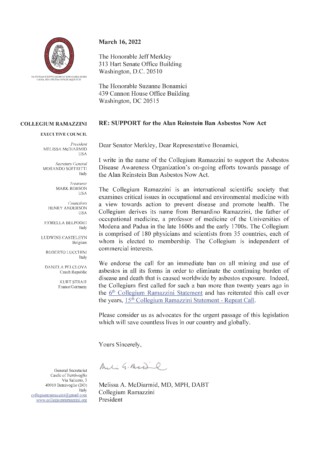Posted on April 27, 2022
 The Asbestos Disease Awareness Organization (ADAO) applauds the Collegium Ramazzini for sending their letter to Senator Jeff Merkley and Representative Suzanne Bonamici, voicing their support of our “on-going efforts towards passage of the Alan Reinstein Ban Asbestos Now Act.” We are grateful that such an incredible academy, one dedicated to preventing disease and saving lives, would take the time to urge Congress to pass an asbestos ban here in the United States.
The Asbestos Disease Awareness Organization (ADAO) applauds the Collegium Ramazzini for sending their letter to Senator Jeff Merkley and Representative Suzanne Bonamici, voicing their support of our “on-going efforts towards passage of the Alan Reinstein Ban Asbestos Now Act.” We are grateful that such an incredible academy, one dedicated to preventing disease and saving lives, would take the time to urge Congress to pass an asbestos ban here in the United States.
In the letter, the Collegium Ramazzini president, Melissa A. McDiarmid, MD, MPH, DABT writes, “We endorse the call for an immediate ban on all mining and use of asbestos in all its forms in order to eliminate the continuing burden of disease and death that is caused worldwide by asbestos exposure.”
The Collegium Ramazzini was founded in 1982, in large part by Dr. Irving Selikoff, a leading asbestos researcher, as an independent, international academy. Their mission is to advance knowledge of occupational and environmental health. They first called for an asbestos ban more than 20 years ago, and have reiterated it over 15 times since.
“The coming together of ADAO and the Collegium Ramazzini, organizations in which I have been active for decades, speaks to the importance of supporting the Alan Reinstein Ban Asbestos Now (ARBAN) Act at this crucial time when leaders in Congress are trying in the name of public health and worker protection to end the scourge of asbestos disease in America, and join into the global community where some seventy countries have already taken this life saving step.” Arthur L. Frank, MD, PhD, Collegium Ramazzini Fellow, Co-Chair of ADAO Science Advisory Board.
Asbestos is a known carcinogen that kills more than 40,000 Americans each year. It is the most hazardous substance that has been in widespread industrial use since the beginning of the twentieth century. The last time the Environmental Protection Agency (EPA) tried to ban asbestos was back in 1989, but the ban was swiftly overturned after industry pressure. Since bowing down to profits over public health, hundreds of tons of raw asbestos have been imported and used in the U.S. each year, and over one million Americans have died from entirely preventable asbestos-related diseases.
When inhaled, microscopic asbestos fibers can become lodged in the lungs, irritating lung tissues. There is no safe level of exposure, which can cause fatal illnesses including asbestosis, lung cancer, mesothelioma, cancer of the larynx, ovary, and other cancers.
The Alan Reinstein Ban Asbestos Now (ARBAN) would ban all six deadly asbestos fibers, force EPA to conduct a study of legacy asbestos found in millions of homes, schools, and workplaces in our country, and provide all citizens with the Right to Know where asbestos is imported and used. Last week, EPA announced the new proposed Part 1: Chrysotile Asbestos Risk Management Rule that would ban importation of raw chrysotile asbestos and chrysotile-containing products for the six conditions of uses addressed in its Part 1: Chrysotile Asbestos Risk Evaluation under the Toxic Substances Control Act (TSCA).
However, EPA’s proposed rule only addresses chrysotile asbestos. It does not restrict importation and use of five other amphibole asbestos fibers that are equally dangerous. Nor does it prohibit current or future uses of chrysotile asbestos beyond the six regulated conditions of use. Because of these gaps and limitations, the proposed rule is not a full asbestos ban. Instead, Congress must ban all uses of all six asbestos fibers now.
Dr. McDiarmid shared, “The Collegium Ramazzini is happy to lend its voice to those of others in calling for banning the use of cancer-causing asbestos as a common- sense measure to protect the public’s health.”
We join in the Collegium Ramazzini’s call for an all-out, no exceptions ban for all six asbestos fibers. Without a ban, millions more lives will be lost.
Linda Reinstein
Social Networks
